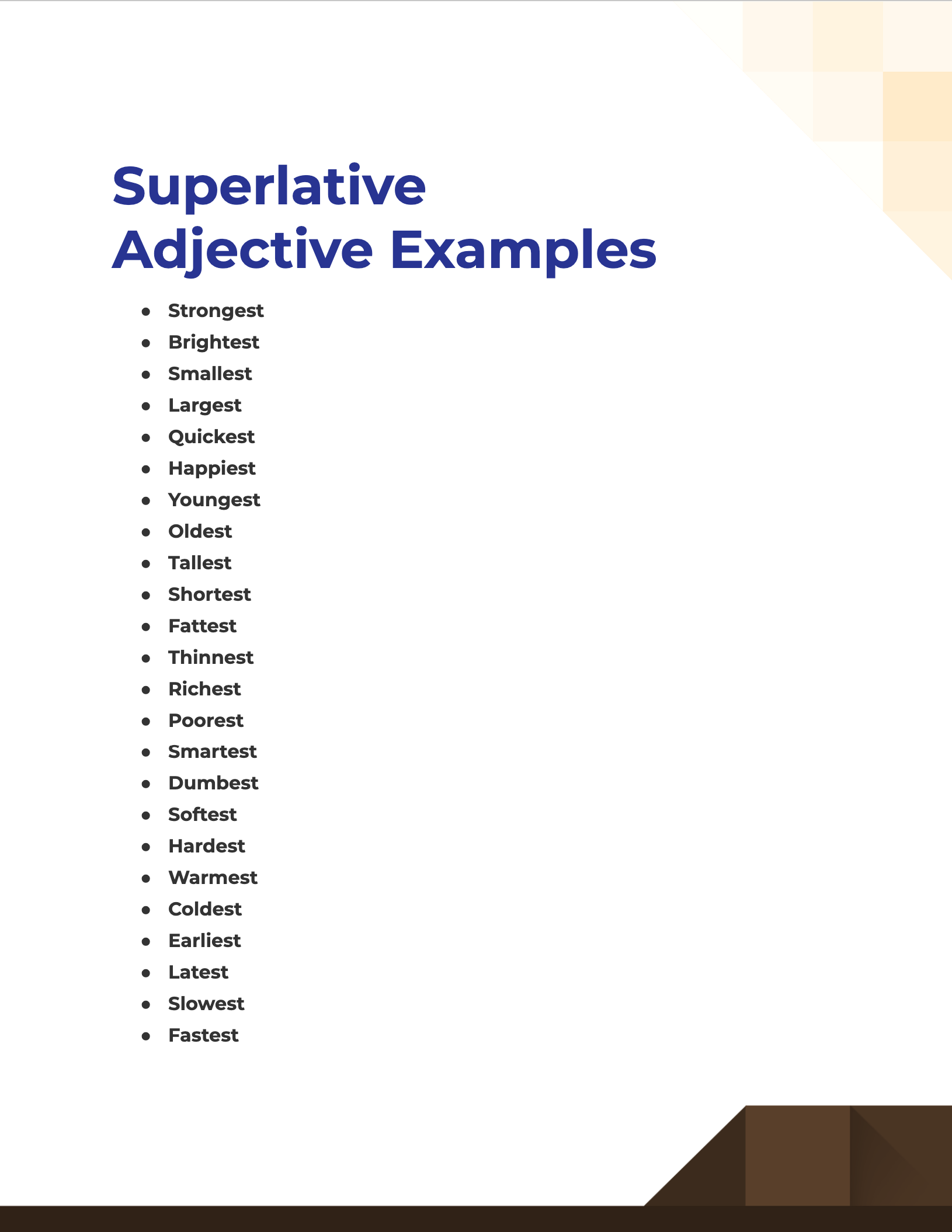99+ Superlative Adjective Examples
Welcome to our comprehensive guide on superlative adjectives! If you’re looking to excel in your use of superlatives, then you’ve landed at the right place. We’ll offer you a wide range of unique adjective examples, step-by-step instructions, and insightful tips to make you a pro in using superlative adjectives effectively. Let’s delve into it!
What is the Superlative Adjective? – Definition
A superlative adjective is used to describe the highest degree of a particular quality when comparing three or more things. In simple terms, it helps you indicate ‘the most’ or ‘the least’ of something.
What is the Best Example of a Superlative Adjective?
One classic example of a superlative adjective is “fastest.” In the sentence, “Usain Bolt is the fastest man alive,” “fastest” is the superlative form of the adjective “fast,” indicating that no man is faster than Usain Bolt.
100 Superlative Adjective Examples

Ready to dive into the world of superlative adjectives? Below, you’ll find a list of 100 distinct and unique examples that can help you enhance your writing and communication.
- Strongest
- Brightest
- Smallest
- Largest
- Quickest
- Happiest
- Youngest
- Oldest
- Tallest
- Shortest
- Fattest
- Thinnest
- Richest
- Poorest
- Smartest
- Dumbest
- Softest
- Hardest
- Warmest
- Coldest
- Earliest
- Latest
- Slowest
- Fastest
- Cleanest
- Dirtiest
- Highest
- Lowest
- Sharpest
- Dullest
- Safest
- Riskiest
- Kindest
- Rudest
- Quietest
- Loudest
- Sweetest
- Sourest
- Fluffiest
- Smoothest
- Roughest
- Fullest
- Emptiest
- Heaviest
- Lightest
- Narrowest
- Widest
- Deepest
- Shallowest
- Closest
- Farthest
- Cheapest
- Most Expensive
- Bravest
- Most Cowardly
- Most Beautiful
- Ugliest
- Most Generous
- Most Stingy
- Most Powerful
- Weakest
- Most Popular
- Least Popular
- Most Honest
- Most Deceptive
- Most Creative
- Least Creative
- Most Comfortable
- Least Comfortable
- Most Interesting
- Most Boring
- Most Intelligent
- Least Intelligent
- Most Loyal
- Least Loyal
- Most Patient
- Most Impatient
- Most Organized
- Most Disorganized
- Most Relaxed
- Most Stressed
- Most Humble
- Most Arrogant
- Most Curious
- Least Curious
- Most Adventurous
- Least Adventurous
- Most Talkative
- Least Talkative
- Most Skilled
- Least Skilled
- Most Confident
- Least Confident
- Most Optimistic
- Most Pessimistic
- Most Social
- Least Social
- Most Flexible
- Least Flexible
- Most Sensitive
Sentence Examples Using Superlative Adjectives
To better grasp how to use superlative adjectives in your writing, let’s look at 10 distinct and unique sentence examples:
- John is the strongest man in the gym.
- She is the brightest student in her class.
- The mouse was the smallest creature in the room.
- Mount Everest is the highest peak in the world.
- The blue whale is the largest mammal on Earth.
- Sarah was the happiest on her wedding day.
- The cheetah is the fastest land animal.
- Grandma is the oldest member of our family.
- This is the most interesting book I’ve ever read.
- He was the most generous person at the charity event.
What are the Rules of Superlative Adjectives?
When it comes to forming superlative adjectives, there are certain rules you should follow:
- For single-syllable adjectives, add -est to the end.
- For adjectives with two or more syllables, use most or least before the adjective.
- Don’t forget to add the before the superlative.
What are the 3 Types of Superlatives?
- Absolute Superlative: No comparison involved, e.g., “She is most beautiful.”
- Comparative Superlative: Compares three or more things, e.g., “He is the most intelligent in the class.”
- Relative Superlative: Compares within a specific set, e.g., “This is the best cake of all the cakes I’ve tasted.”
What are the Exercises to Practice Superlative Adjectives
To get a firm grip on using superlative adjectives, practice is key. Here are some exercises you can do:
- Fill in the blanks with the correct form of the adjective.
- Identify the superlatives in a given paragraph.
- Create your own sentences using the superlatives provided.
How to Use a Superlative Adjective? – Step by Step Guide
Understanding superlative adjectives is one thing, but using them effectively in your writing is another. Here’s how to do it:
- Identify the Quality: Decide the quality you are comparing—strength, intelligence, etc.
- Choose the Right Form: If the adjective is short, add -est. For longer adjectives, use most or least.
- Use ‘The’: Place the before the superlative adjective.
- Context Matters: Make sure you are comparing three or more subjects.
- Check Spelling: Some adjectives have irregular forms, such as “good” becoming “best.”
- Review and Revise: Read your sentence to ensure the superlative fits naturally and enhances the message.
Follow these steps diligently, and you’ll find that using superlative adjectives can be quite straightforward and impactful!
Tips for Using Superlative Adjectives
Here are some practical tips to get the most out of superlative adjectives:
- Context is Key: Make sure you’re comparing three or more things or people.
- Be Specific: Vague superlatives can confuse readers. Be clear on what is being compared.
- Avoid Double Superlatives: Phrases like “most fastest” are grammatically incorrect.
- Use Sparingly: Overuse can dilute the impact of your writing.
- Adhere to Conventions: Make sure to use “the” before the superlative and to know when to use “most” or “-est.”
- Be True: Ensure that the superlative used is factually correct.
- Enhance, Don’t Distract: The superlative should enhance the sentence, not make it convoluted.
- Syntax Matters: Make sure the sentence structure complements the superlative.
- Cross-Check Facts: If you are claiming something is the “best,” “most,” or any other superlative, be prepared to back it up with facts or evidence.
- Read and Revise: After writing, read your content to ensure the superlative fits and makes sense.



